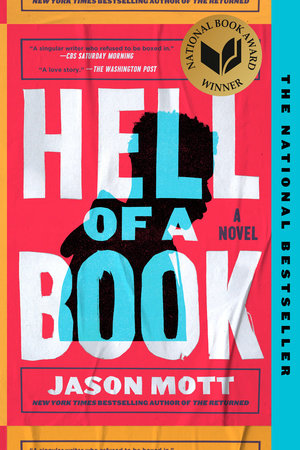
Hell of a Book is a hell of a book. This is a familiar refrain throughout the book, a running meme. The basic premise is that The Author is on cross-country tour to promote his first novel, Hell of a Book. There are many hilarious, insider jokes about how publishing works, the grind of promoting a novel, media training, and the various handlers who shepherd the author through each city’s schedule of events. This author is being run off his feet and by the end he has a break down. But the break down isn’t really about the tour schedule. The backdrop is that in every city, at every stop, there is a news story about the latest Black kid who has been shot dead by the police. The author is a Black author. He’s asked to speak to this tragic situation. But what is he going to say?
The Author’s story of growing up in a small town, and escaping to become a well-travelled writer, is told alongside the story of The Kid, a boy whose skin is so black that people can’t seem to not mention it. The Kid even suffers slurs from his lighter-skinned cousin who taunts him with the name “Soot.”
The twist is that the stories of The Author and The Kid may be one and the same. The Author has a wild imagination and often sees things that aren’t there. He sees The Kid often enough that it’s hard to know if The Kid is his imagination, or his younger self.
But the reveal isn’t whether The Author and The Kid are the same. The reveal is about what it means to be Black in America. Racism, injustice, and violence prevail, and it means that Black people live with the fear of that ugly eye noticing them, attacking them, destroying their families. They live with that sense of disbelief that the violence continues, that nothing seems to change, that identifying with your community could be fatal.
The Kid knows that his parents want him to be unseen and safe. Invisibility is safety. Don’t get noticed. The Author demonstrates how self-destructive this coping mechanism is but, between his story and The Kid’s, it’s clear that the anxiety and stress of racial trauma is generational. Why is there a collective head nodding about having the conversation with your kids about what it means to be Black and how you have to behave differently to survive? Why is that acceptable? And yet that’s the reality readers are presented with. What you imagine may not be someone else’s reality.
The Kid imagines a world where his father isn’t shot dead by police, where his parents aren’t afraid for him because of the colour of his skin, where he can look in the mirror and love who he is and what he looks like.
Is that not what we all want? Self love? During media training, the Author is told that his novel is a love story. I think it is. And we all have a choice to uphold or disrupt the narrative.
Check out the publisher site for where to buy the book.